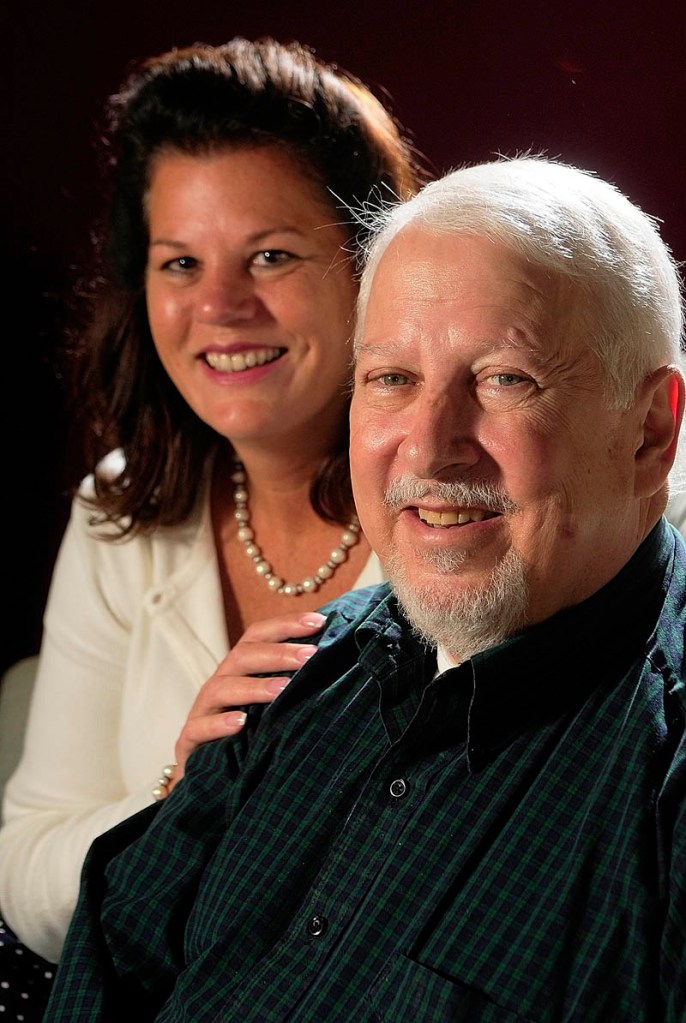AUGUSTA — John Poulin knew he slept all the time and that even short walks to the other side of the house would drain him of every reserve of energy, but he had no idea how sick he had been until he started to feel better. Poulin was the proverbial frog in a pan of water, slowly being brought to a boil.
“It happens over such a long time you don’t know how bad you feel,” Poulin said.
The relief came last month when Poulin emerged from an operating room at Massachusetts General Hospital with a new kidney harvested from Poulin’s daughter-in-law, Julie Poulin. It was a gift that John Poulin initially refused to accept, but one that Julie Poulin was determined to give.
“From the minute someone said, ‘Why are you doing this?’ I said, ‘Why wouldn’t I?’” Julie Poulin said.
John Poulin’s path to kidney failure began when the 66-year-old Augusta man, then a young U.S. Marine, was sent to Vietnam in 1965. It was there that Poulin was exposed to the chemical defoliant Agent Orange, which led to diabetes at a young age, in the late 1970s. The diabetes, in turn, led to hypertension and kidney disease in the early 2000s.
The disease slowly ravaged Poulin’s body. His wife of 46 years, Carol Poulin, whom John Poulin began dating while both attended Cony High School, felt helpless to help her husband.
“He didn’t look sick, but I knew how he felt,” she said. “He’s been sick since we retired.”
John Poulin started the process of getting a new kidney about five years ago at Maine Medical Center in Portland. It eventually took him to Mass General. He was comforted by the sheer volume of transplants Mass General performs every year.
“When you go for a transplant it’s important to look for a hospital that does a lot of them,” Poulin said.
Next came finding a donor. Poulin had hoped to get on a list and wait for a kidney through a donor program, but Julie Poulin, 49, had other ideas.
“No one asked me,” she said. “I offered. We have a great relationship.”
Accepting the offer was difficult for John Poulin. It just seemed like too much.
“I had to make a decision whether to accept Julie’s offer,” he said. “Talking to my family and doctors, they said, ‘You can’t refuse an offer like this.’”
The testing began in January. John and Julie Poulin each had a team of specialists that ran tests that Julie Poulin described as exhaustive. There were even psychiatric examinations to make sure she understood the consequences of a living organ donation.
“If there was anything wrong, they would have found it,” Julie Poulin said. “A whole team makes the decision.”
The transplant, statistically at least, made sense. Julie Poulin has blood type O-positive, which is a universal donor type. John Poulin has type A-positive blood, which makes him a universal recipient.
Moreover, John Poulin never had gone on dialysis, which can compromise immune systems. The decision improved the chances his body would accept the new organ, Poulin said. Also, the fact that the organ was coming from a living donor improved the likely success rate by 20 percent and makes Poulin likely to live longer. John Poulin had suffered no symptoms of diabetes since bariatric surgery in 2011. He lost 65 pounds as a result of the surgery.
Julie Poulin said there have been no lasting effects of the surgery, which occurred Sept. 10. Poulin left the hospital three days later.
“By Sunday, I walked two miles on the treadmill,” she said. “I was back to work in 13 days.”
John Poulin has faced a few bumps since the surgery, including an emergency trip back to Massachusetts General, but overall he continues to be amazed at how good he feels. His kidney function, which hovered around 13 percent before the surgery, has soared past 65 percent. There is even a chance Poulin’s old kidneys, which were left in place, could resume function, he said. The trips around the house and the yard that once proved so difficult are now routine.
“I didn’t even know where he was in the house the first week,” Carol Poulin chuckled.
John Poulin is committed to living a full life. He looks forward to bowling and is even talking about running a 5-kilometer race with Julie. She eschews any notion of being a hero — she agreed to be interviewed only because she hopes others would consider organ donation — but John Poulin said he shares a bond with his daughter-in-law that he could not have before. He openly describes her as his lifesaver.
“I told the doctors and the nurses, ‘I’m going to do everything you tell me, because my main mission in life is to protect that kidney,” he said. “Every Marine has a mission. That’s my new mission.”
Craig Crosby — 621-5642
ccrosby@centralmaine.com
Send questions/comments to the editors.


